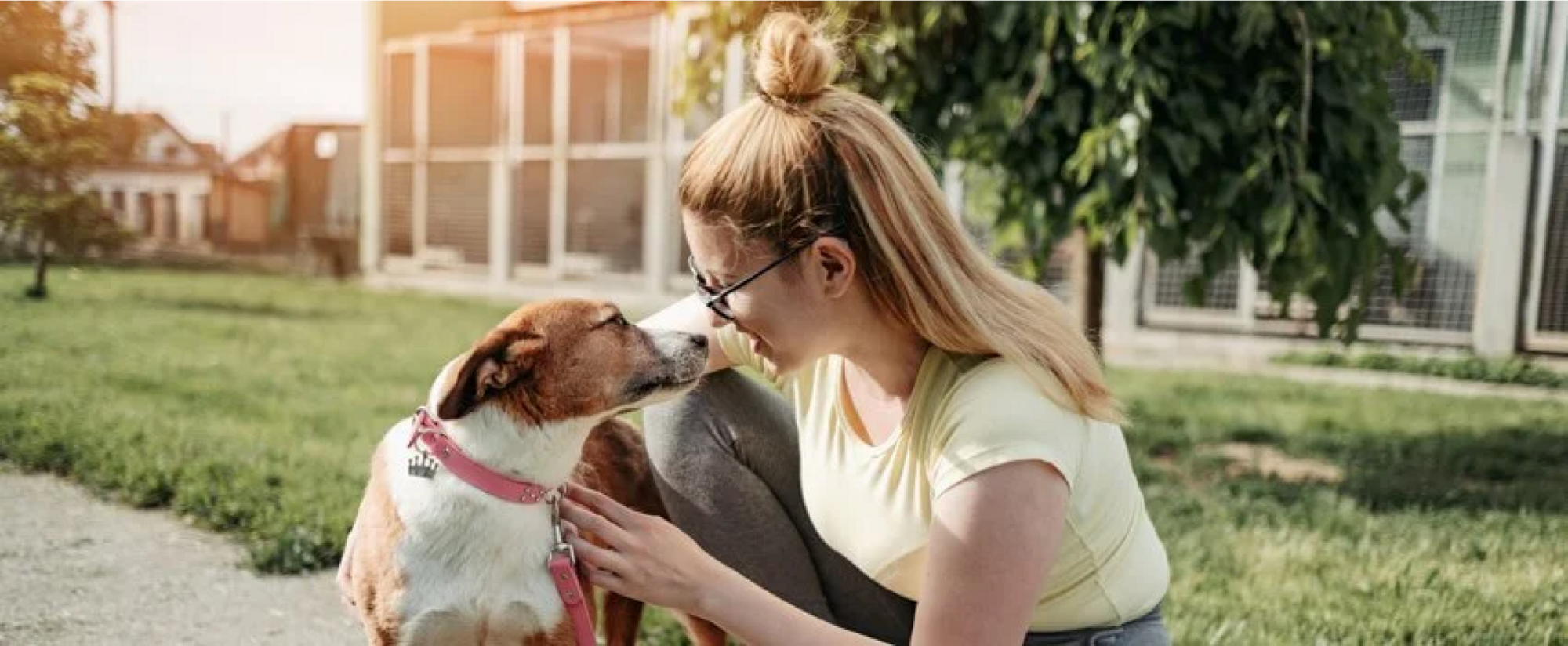Last Updated: 06/05/2025
Author: Dr Teagan Lever BVSc (Hons)
Reading Time: 28 minutes - medium read
Rescue pets come in all shapes, breeds, and sizes, each one possessing a unique personality and a longing for a loving home. Last year, an astounding 66,536 rescue pets were seeking new families through PetRescue.com.au.
If you're looking to bring a new pet home, adopting a rescue pet not only offers you a wonderful companion but also provides an opportunity to make a real difference in the life of a pet in need.
Things to consider:
Choosing the right type of pet

First of all, consider what type of pet would be most suitable to your living situation, environment, future plans, activity level, lifestyle, budget and available time. You'll need to project well into the future as you want any pet that you've adopted to be suitable to your long term plans. If you already have furry family members, consider their needs and how well they will adapt to a new addition to the family. If you have children, check out our guide to the best pets for kids.
It's also important to appreciate the nutritional, behavioural and health needs of species to ensure their welfare needs are met. It can be tempting to base a choice on looks alone, however selecting the right pet should be based on a number of factors that will help to decide which pet will best suit your lifestyle. You should also consider what you will do if you need to travel or go on holidays, how will your pet be cared for in your absence?
Ensuring a good match
Getting to know a potential pet is essential. Each one has unique quirks and personality traits, even siblings can be wildly different. The good news is that many rescue pets live with foster families who really get to know them in a home environment. They can tell you all about their behaviour, whether they're shy or outgoing, and what kind of home they'll thrive in. Also, don't hesitate to ask the rescue organisation about their adoption trial policy. It's all part of ensuring your new pet is the perfect addition to the family.
Adopting a Dog

Although breed is often the first thing we think of when deciding to get a dog, breed alone is not an accurate indicator of behaviour, care requirements, or a dog's suitability to your family or lifestyle. Breed may give you insights into more generalised traits such as typical exercise needs, play styles or grooming requirements, but factors such as size, age and energy levels are more significant predictors of a successful match.
Ultimately like humans, each dog is an individual and getting to know them through their foster carers or rescue group is the best guide to choosing your new dog.
Dogs of all ages are surrendered into rescue, and while puppies and young dogs are cute, they require the most commitment and effort. Adult dogs may be a better choice if you are looking for a dog to fit more easily into your lifestyle. One great thing about adopting an adult dog is that their personality is already formed, so you know exactly what you are getting (and the foster carer can tell you what a pet is like in a home) rather than a puppy which is always a surprise! Check out our 5 reasons to adopt an adult dog.
How much space do you have?
The size of your home and the availability of open spaces nearby for exercise should influence the type of dog you might choose.
How much exercise will you be able to offer your dog?
Different breeds, ages and individual dogs require differing levels of exercise, so it's important to ensure you can meet these exercise needs. A smaller breed doesn't necessarily mean less exercise (and the reverse is true so it's best to do your research). In fact, most giant breeds need less exercise than smaller breeds. Greyhounds, for example, require less exercise and make great apartment dogs! Find out the 10 reasons to adopt a greyhound.
How much time will your dog spend alone?
Dogs are social animals that generally thrive on companionship, but the amount of attention they need can vary. If you have a busy schedule, make this a consideration. Older dogs often need less stimulation and may be more content to rest and sleep, potentially making them more suited to spending time alone. Younger dogs, on the other hand, typically require more playtime and interaction. Prolonged solitude at any age can lead to anxiety or boredom for any dog, so it's wise to consider your daily routine and explore options like dog walkers or doggy daycare if needed.
How much will everything cost?
A rescue dogs adoption fee includes desexing, vaccinations and microchipping, but you do need to consider both the initial costs, such as a dog crate, bed, collars & leads, etc, as well as the ongoing costs, such as food, veterinary expenses, enrichment toys, training, holiday care and potential grooming costs.
Adopting a Cat

If you think a kitten or cat would make a great family addition, apart from the differences in their appearance, each cat has a distinct personality. Just like for dogs, it's important to choose a new kitten or cat carefully and not select on looks alone.
With a wide variety of ages, breeds, and personalities available, there is a cat to fit into most lifestyles and families. Whether you're looking for a playful kitten, a laid-back senior cat, or anything in between, there are a few primary considerations before adopting.
Settling In
Bringing a new cat home is exciting, but it's essential to remember that settling in takes time. Cats might need a few days or even weeks to adjust to their new environment. Can you provide a quiet space with all the essentials and allow them to explore at their own pace? Patience and gentle encouragement will help your new pet feel safe and loved.
Tips on bringing a new cat home.
Personality and age
Shy cats take a little longer to settle in but bond very strongly with their pet parents. Kittens are undoubtedly cute but will need more attention and activity, and there are plenty of great reasons to adopt an adult cat.
Find out about a cat's individual personality and needs by reading their profile on PetRescue.com.au and then speaking to the rescue organisation that has them in care.
Inside/Outside
Consider whether you want an indoor only cat or one that can roam outside. Assess your living situation, local regulations, and the specific needs of the cat you are adopting to make the best decision.
Pet Compatibility
Introducing a new cat to existing pets can be challenging, and understanding that it takes time and patience is crucial. Gradual introductions, monitored interactions, and allowing each pet their space can foster a peaceful coexistence. Choosing a cat that is good with other animals is crucial if you already have a pet.
Grooming
Longhaired cats require more grooming, so be prepared to brush them daily to keep their coat in good condition.
Consider the Cost
Owning a cat is often less expensive than owning a dog, but it's still essential to budget for ongoing expenses like food, litter, veterinary care, grooming and toys. While initial adoption fees might be lower, there is still a long-term financial commitment involved in providing a happy and healthy life for your cat.
Adopting two kittens or a bonded pair
If you're considering adopting a cat, why not adopt two? Cats often benefit from having a playmate, especially if they are going to be inside cats. Preventing loneliness, keeping active, and even helping each other settle into their new home are great reasons to consider adopting two. Plus, it can be twice as rewarding for you!
Where Can I Adopt a Pet?
Visit PetRescue.com.au to find thousands of rescue pets at hundreds of trusted Australian rescue organisations. Take your time, don't rush and make an informed choice. If you do, you'll be well on your way to building a long and happy relationship with your new best friend.
From selecting the perfect match to understanding the time it takes to settle in and build relationships with other pets, thoughtful consideration ensures a positive experience for everyone involved. Whether it's your first time adopting or you're adding to your existing pet family, knowing what to expect can make the transition smoother and lead to a long-lasting relationship for all.
Further Reading
Want to read more? Check out our other articles:
Premium Pet Food, Is it Worth It?
Want to know more? Check out our Vet Tips Page for more tips on keeping your pets happy and healthy.